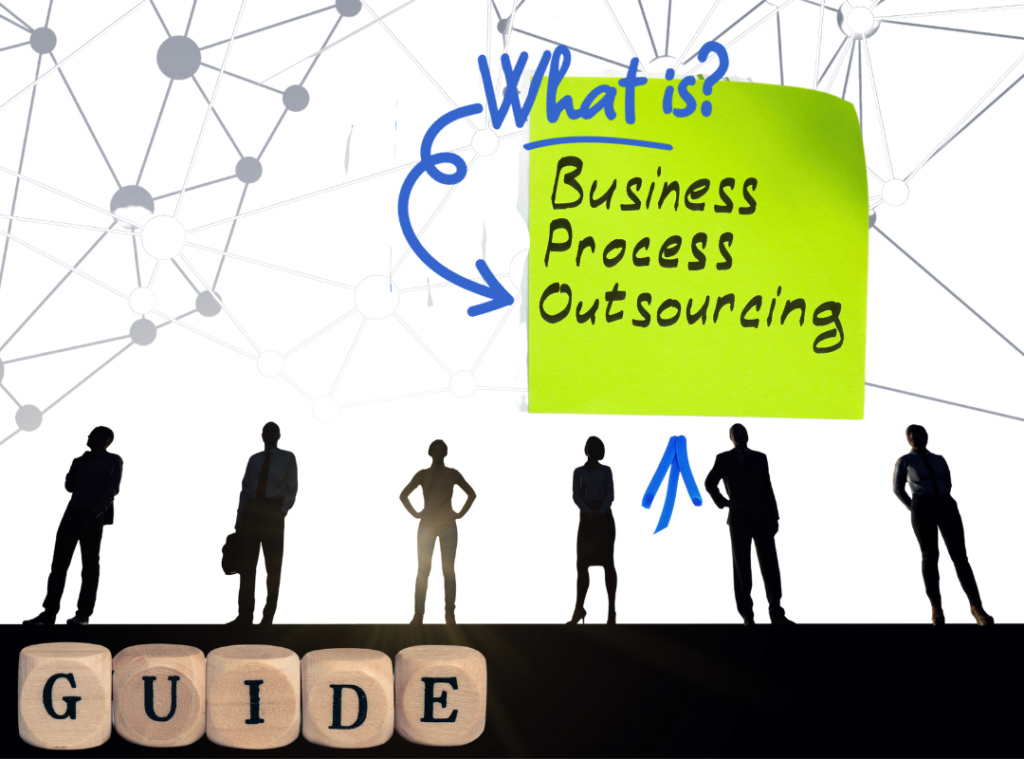Business Process Outsourcing (BPO) is a common practice where businesses outsource non-core functions to external service providers. By doing so, companies can focus on their core competencies while specialized service providers take care of other business tasks. BPO has become increasingly popular among small to large-scale businesses, as it provides several benefits that help streamline operations and drive business growth.
In this guide, we will provide a comprehensive understanding of what business process outsourcing is, its definitions, benefits, types of services, and potential drawbacks. We will also explore how companies can leverage BPO to gain a competitive advantage and discuss the future of the industry.

Key Takeaways
- Business Process Outsourcing (BPO) involves outsourcing non-core functions to external service providers.
- BPO can provide several benefits such as cost savings, access to specialized skills, increased efficiency, and scalability.
- Companies can outsource tasks such as customer support, data entry, IT services, and more.
- Potential drawbacks of BPO include communication challenges and loss of control over processes.
- BPO can help streamline business operations, drive growth, and gain a competitive advantage in the market.
Defining Business Process Outsourcing (BPO)
Business process outsourcing (BPO) involves contracting specific business functions to external providers. By doing so, companies can focus on their core competencies and leave the outsourced tasks to the experts.
BPO is a strategic move that can benefit businesses in many ways. It can increase efficiency, reduce costs, and provide access to specialized skills. Companies can outsource a variety of tasks, such as customer support, data entry, and IT services.
“Outsourcing is not just a trend; it is an integral part of how smart companies do business today.” – J. Brian Quinn
Outsourcing can help businesses stay ahead of the curve and remain competitive in their industry. By understanding what BPO is and how it works, businesses can make informed decisions about whether this strategy is right for them.
Benefits
Business process outsourcing (BPO) offers several advantages to companies that choose to outsource certain functions. Here are some of the main benefits of BPO:
Advantages | Description |
Cost savings | By outsourcing non-core functions, businesses can reduce overhead costs associated with hiring and managing in-house employees. |
Increased efficiency | Outsourcing allows companies to focus on their core competencies, while specialized service providers handle specific functions. This leads to increased productivity and efficiency. |
Access to specialized skills | BPO companies often have expert knowledge and experience in specific areas, such as customer service or IT services. By outsourcing to these providers, businesses can access these skills without having to invest in extensive training or hiring. |
Scalability | Outsourcing allows businesses to scale their operations up or down based on changing needs. This flexibility is particularly advantageous for companies that experience seasonal fluctuations in demand. |
In summary, BPO can help businesses reduce costs, increase efficiency, access specialized skills, and scale their operations. These advantages can lead to improved business performance and increased competitiveness in the market.
Types of BPO
Business Process Outsourcing (BPO) covers a wide range of services, each with its own specialized focus. Below, we’ll discuss the different types of BPO services and the industries they cater to.
Customer Support Outsourcing
One of the most common types of BPO is customer support outsourcing, which involves outsourcing customer service functions such as phone and email support, live chat, and social media management. Companies that offer customer support outsourcing services include Sykes, Teleperformance, and Convergys.
Data Entry Outsourcing
Data entry outsourcing involves the transfer of data from physical documents to digital format and is commonly used in healthcare, finance, and retail industries.
IT Outsourcing
IT outsourcing involves the outsourcing of IT functions, including software development, infrastructure management, and network security.
Finance and Accounting Outsourcing
Finance and accounting outsourcing involves outsourcing financial operations such as payroll processing, bookkeeping, and tax preparation.
Human Resources Outsourcing
Human resources outsourcing involves outsourcing HR functions such as recruitment, benefits administration, and training and development.
Choosing the right type of BPO depends on the specific needs of your business and the industry you operate in. By understanding the different types of BPO services available, you can choose the ones that will offer the most significant benefits to your business.
Popular BPO Services
When it comes to outsourcing business processes, there are a myriad of services that companies can choose from. Here are some of the most popular business process outsourcing services:
Service | Description |
Inbound call center services | Providing customer support, answering inquiries, and handling complaints through phone calls. |
Live chat agents | Engaging customers in real-time chats to provide sales support and customer service. |
Back office support services | Performing administrative tasks such as data entry, record keeping, and accounting. |
These are just a few examples of the wide range of services offered by business process outsourcing companies. By outsourcing these tasks, businesses can focus on their core operations, increase their efficiency, and improve customer satisfaction.
Advantages and Disadvantages of Business Process Outsourcing (BPO)
Business process outsourcing (BPO) can bring several advantages to companies, but there are also some potential drawbacks to consider before deciding to outsource. In this section, we will explore both the advantages and disadvantages of BPO.
Advantages of Business Process Outsourcing (BPO)
One of the primary advantages of BPO is cost savings. By outsourcing non-core functions to external service providers, companies can save money on salaries, benefits, and overhead costs associated with maintaining in-house teams for those functions. Additionally, outsourcing can help reduce capital expenditures on technological infrastructure and equipment, as the service provider assumes these costs.
BPO can also provide access to specialized skills and expertise that may not be available in-house. For example, outsourcing IT services allows companies to leverage the knowledge and experience of expert IT service providers. This can result in better quality work, increased productivity, and improved performance.
Another benefit of BPO is scalability. Outsourcing allows companies to easily increase or decrease the resources allocated to a specific function to meet changing demands. This can help improve operational efficiency and reduce waste.
Disadvantages of Business Process Outsourcing (BPO)
One of the potential risks of BPO is the loss of control over processes. When an organization outsources a function, it may lose some of the control over how that function is performed. This can result in a lack of transparency and accountability, which can be detrimental to the company’s operations and reputation.
Communication challenges can also arise when outsourcing, particularly if the service provider is located overseas. This can result in delays, misunderstandings, and a lack of responsiveness, which can negatively impact business performance.
Finally, outsourcing can create a potential risk to data security and privacy. This risk can be mitigated by selecting a reputable service provider that has strong data security protocols in place and is compliant with relevant regulations and standards.
How Business Process Outsourcing (BPO) Drives Business Growth
Business process outsourcing (BPO) is a powerful strategy that can help companies to achieve growth by focusing on their core business functions. By outsourcing non-core tasks to external service providers, businesses can streamline their operations and achieve operational efficiency.
One of the key advantages of BPO is that it allows companies to scale their operations to meet changing demands. For example, as a business grows, its customer service requirements may increase. By outsourcing customer support services, companies can quickly scale their operations to meet these demands without having to invest in additional resources.
Another advantage of BPO is that it can help businesses to achieve cost savings. Outsourcing tasks to service providers in countries with lower labor costs can be significantly cheaper than hiring and training in-house staff. This can free up resources for businesses to invest in their core competencies, driving growth and innovation.
Furthermore, BPO can provide access to specialized skills and expertise that may not be available in-house. For example, outsourcing IT services to a service provider can provide access to the latest technology and technical expertise, without the need to build an in-house IT team.
In summary, BPO is a powerful strategy that can help businesses achieve operational efficiency, cost savings, and access to specialized skills. By leveraging BPO effectively, businesses can streamline operations, drive growth, and gain a competitive advantage in the market.
Streamlining Your Business through Business Process Outsourcing (BPO)
Business process outsourcing (BPO) is an effective way for companies to streamline their operations and improve overall efficiency. By outsourcing non-core functions, businesses can free up resources, enhance productivity, and focus on their core competencies. In this section, we will explore the definition of BPO and the benefits it can provide to your business.
Business Process Outsourcing Definition
Business process outsourcing is the practice of contracting specific business functions to external service providers. These functions can include customer support, data entry, IT services, and more. By outsourcing these non-core functions, businesses can focus on their core competencies and achieve higher levels of operational efficiency.
Benefits of Business Process Outsourcing
The benefits of BPO are numerous. One of the most significant advantages is cost savings. By outsourcing certain processes, businesses can reduce the costs associated with hiring and training in-house staff. Additionally, BPO can provide access to specialized skills and expertise that may not be available internally.
Another advantage of BPO is scalability. Outsourcing allows businesses to adjust their operations quickly to meet changing demands. This is especially useful during seasonal peaks or when implementing new projects.
Overall, BPO can help businesses become more agile, efficient, and focused on their core competencies. By streamlining operations and freeing up resources, businesses can achieve higher levels of productivity and profitability.
Leveraging Business Process Outsourcing for Competitive Advantage
Business process outsourcing (BPO) is no longer just a tool for cutting costs but a strategic lever for gaining a competitive advantage in the market. By outsourcing non-core functions to specialized service providers, companies can free up resources and streamline operations, allowing them to focus on core competencies and pursue growth opportunities.
The advantages of BPO for driving business success are numerous:
Outsourcing enables companies to access specialized skills and expertise that may not be available internally. This can include technical, language, or customer service skills that are critical for certain business functions.
By outsourcing non-core functions, companies can achieve greater operational efficiency and reduce costs associated with maintaining the internal workforce and infrastructure required to perform those functions.
Outsourcing allows companies to scale operations up or down quickly in response to changing market demands, without incurring additional fixed costs.
Moreover, outsourcing certain functions can help achieve cost savings, improve process quality, and enhance customer satisfaction, all of which can create a competitive differentiation in the market.
When it comes to BPO, there are several types of services that companies can outsource, ranging from customer service and back-office support to IT services and data analytics.
While BPO offers numerous advantages for businesses, it is important to acknowledge that there can be potential disadvantages as well. These can include communication challenges, loss of control over processes, and cultural differences that may impact the quality of service delivered.
Overall, leveraging BPO effectively can help companies achieve operational excellence, drive growth, and stay competitive in a rapidly evolving market. By partnering with the right BPO service provider, businesses can access specialized skills, reduce costs, and focus on innovation and growth strategies that can help them stay ahead of the curve.
The Future of Business Process Outsourcing
Business process outsourcing (BPO) has come a long way since its inception in the 1980s. With the rise of globalization and advancements in technology, BPO has become a popular business strategy for companies of all sizes and industries.
So, what does the future hold for BPO? As new technologies emerge, the BPO industry is likely to continue growing and evolving.
Emerging Technologies
One of the most significant technological advances impacting the BPO industry is automation. As companies seek to streamline their operations and reduce costs, automation tools such as robotic process automation (RPA) and artificial intelligence (AI) are becoming increasingly valuable. For example, AI-powered chatbots can handle routine customer service inquiries, freeing up human agents to address more complex issues.
Another emerging technology with the potential to disrupt the BPO industry is blockchain. Blockchain technology can be used to create decentralized platforms, enabling secure and transparent transactions that do not require intermediaries. This technology could be applied to various BPO processes such as finance and supply chain management.
Newer companies are often more agile and can be more focused on specific niches or industries, offering specialized BPO services. As such, they can provide a real challenge to the established players.
The Future of BPO
The BPO industry is expected to continue growing, driven by the increasing demand for cost-effective and efficient business solutions. As new technologies emerge, companies will likely seek to leverage them to improve their BPO processes. Additionally, the industry is likely to see increased specialization and niche BPO providers offering highly specialized services.
As technology and competition continue to shape the BPO industry, businesses that leverage BPO effectively will be better positioned to improve their operational efficiency and gain a competitive advantage in the market.
There is a continued increase in fully remote options which will only grow further as remote working technology advancements continue to allow for great talent to work anywhere in the world.

Conclusions
After reading this comprehensive guide, you now have a clear understanding of what business process outsourcing is, its benefits and potential drawbacks. By taking advantage of BPO and outsourcing non-core functions, companies can streamline their operations, achieve operational efficiency and scale their business to meet market demands.

FAQ
Business process outsourcing (BPO) involves contracting specific business functions to external service providers. It allows companies to focus on their core competencies while outsourcing tasks such as customer support, data entry, and IT services.
Businesses can enjoy various benefits through BPO, including cost savings, increased efficiency, access to specialized skills, and scalability. Outsourcing certain processes can help streamline operations and drive business growth.
Some common types of BPO services include customer support, data entry, IT services, and back office support. There are also well-known BPO companies in the market that provide these services.
Examples of popular BPO services include inbound call center services, live chat agents, and back office support services. Companies often outsource these functions to specialized service providers.
The advantages of BPO include cost savings, access to expertise, and operational efficiency. However, potential disadvantages can include communication challenges and loss of control over processes.
BPO can drive business growth by allowing companies to focus on core functions, achieve operational efficiency, and scale their operations to meet changing demands. It helps businesses streamline their operations and optimize resources.
By outsourcing non-core functions, BPO can free up resources, enhance productivity, and improve overall efficiency. It allows businesses to allocate their resources strategically and focus on key areas of their operations.
By outsourcing certain functions, businesses can access specialized skills, stay updated with industry trends, and focus on innovation and growth strategies. BPO allows companies to gain a competitive edge in the market.
The future of BPO is promising, with emerging technologies such as automation and artificial intelligence reshaping the industry. These advancements have the potential to further streamline processes and drive growth in the BPO sector.
Related posts

Per Ticket Support Advantages: Improve Your Service
Per ticket support is a customer service model that offers numerous advantages for businesses. By implementing a ticketing system, companies can enhance their customer service

Live Chat Support in 2024 – The Complete Guide
Welcome to our complete guide on live chat support in 2024. As customer service continues to evolve, live chat support has become an essential tool


